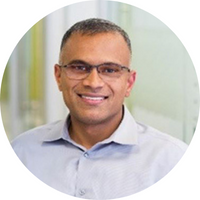
Key Takeaways:
- Vikram Gopal shares his secret to keeping the innovative spirit alive
- Vikram gets candid about how his educational experiences in India, Alabama, and Michigan has shaped him into who he is today
What are the non-technical skills you most highly value in scientists at Ascend Performance Materials? And why?
At Ascend, we believe collaboration and open feedback drive innovation. We expect everyone, not just our scientists, to work within and across teams to understand the full scope of problems and develop sound, sustainable solutions. Innovation involves failure, especially when you are pushing technology to its edge. It is critical for team members to demonstrate humility for what we know and respect critical feedback.
What is the secret to keeping the innovative spirit alive at a company like Ascend?
To maintain and grow innovation we set broad parameters and empower people. The parameters are our values and vision. The values are constant while the vision can change to meet the needs of the market. We judge all our actions against those two foundations.
We also empower and rely on our people to raise their hands when they identify a problem and/or have a solution. We use continuous improvement tools to ensure our solutions are sustainable.
Please share a situation in which you got something wrong, and what you learned from it.
Earlier in my career, I was launching a new business focused on environmentally sustainable products. Our initial hypothesis was that the predominant need was in the automotive sector, so our application development was focused on that sector. However, as we began to test the market, we realized that consumer electronics had pent up demand for our solution. We quickly pivoted our portfolio strategy to meet the needs of the consumer electronics sector.
It taught me the importance of taking a broad view upfront, to think through program lifecycles and to be agile and change when necessary.
How have your parents influenced your leadership style?
I was born into a family of engineers, scientists and entrepreneurs. My mother and grandmother were teachers, my dad is a nuclear engineer, my grandfather was a rocket scientist and each of them was a leader in their fields. Even today, my parents continue to run a successful application research & development business focused on solving difficult hydraulic engineering problems. They taught me to be comfortable making decisions with limited data and to focus on the critical information.
You have lots of experience building successful teams. What are the challenges associated with accomplishing that?
My job as a leader is to set a singular vision for my team, sell them on that vision and remove as many obstacles as possible in achieving that vision. When you have a team of highly intelligent and accomplished people, aligning everyone and sharpening their focus on their particular piece of that vision can be a challenge and requires tremendous determination and focus on my part.
Your employer aside, what company do you most admire, and why?
Our industry is full of innovative companies. I admire 3M, Edwards Life Sciences, DuPont and EMS for the ways they approach problems, lead change and move technology forward.
You did your undergraduate work in India, your Ph.D. in Alabama, and your M.B.A. in Michigan. How did each of those experiences most shape the person you are today?
Each of my educational experiences played a part in my development. My undergraduate education gave me a solid foundation in the basics, while my MS and Ph.D. taught me to how to connect the dots and formulate solutions in the face of complex problems. And my MBA taught me how to apply this thought process to real business problems.
How did someone who attended undergraduate and graduate schools in very warm climates end up pursuing an M.B.A in Michigan?
I have been fortunate to find people and organizations who supported my technical and professional growth. In Alabama, Dr. Gary April gave me the freedom to pursue my academic interests, get grants and build an entire lab. When I was working at GE in Detroit, the company supported my decision to pursue an executive MBA.

Vikram Gopal has broad experience in the advanced materials industry with expertise in research and development, product development, process engineering and applications development. Before joining Ascend Performance Materials in May 2015, he was vice president of technology at Invista Engineering Polymer Solutions. Vikram has vast knowledge of the nylon 6,6 market and is credentialed as a Six Sigma Black Belt.
Vikram has been recognized for multiple industry awards for rapid product development and value creation for his teams. He holds a bachelor’s degree in petrochemical engineering from the University of Pune in India, a doctorate degree in chemical engineering from the University of Alabama and an MBA from the University of Michigan’s Ross School of Business.
This article has been edited for length and clarity. The opinions expressed in this article are the author's own and do not necessarily reflect the view of their employer or the American Chemical Society.
Copyright 2019 American Chemical Society (All Rights Reserved)








